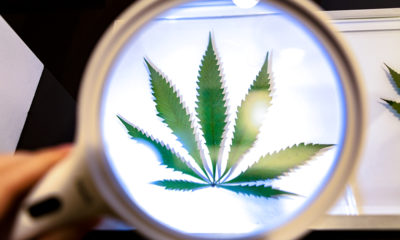Medical
Cannabis: What About the Children in Illegal States?
“Any parent in the world would do it, the situation we were in was bleak. We didn’t have a choice,” says Sean Black.
Black is referring to the controversial decision to give his daughter medical cannabis — in Iowa.
“If you could see what it did in four hours time… there isn’t a person in the world who can dispute the effectiveness of this medicine.”
At 3 years old Black’s daughter, Lydia, was diagnosed with Lennox Gastaut Syndrome, a rare form of childhood epilepsy. She experienced her first seizure at just 6 months old. On Easter Sunday 2007 the Blacks put their happy, healthy baby to bed and awoke the following morning to hear gurgling and gasping noises coming from the baby’s crib. They went in to find her face had turned blue and a black gooey substance was oozing from the infant’s mouth and nose. She was having a seizure. They called 911 and Lydia was brought to the hospital where doctors struggled to take her out of the seizure. After several rounds of rescue meds, the seizure stopped.
Because Lydia’s temperature spiked to 104 degrees, doctors assumed the seizure was “febrile” or induced by the fever. She was sent home with a prescription for Phenobarbital, a powerful barbiturate. Two and a half years and many seizures later, she received the devastating diagnosis. Over time, Lydia’s condition has alternated from manageable to out-of-control as she has cycled through different medications to mitigate her seizures. She suffers from daily multiple seizures that present apathy and unresponsiveness in addition to feelings of dizziness. She doesn’t hold her own head up and her muscles are usually rigid. She rarely sleeps and never restfully.
Lydia has failed to progress. At 8 years old, she weighs just 34 pounds and the only words she can say are “mom” and “hi.” She can no longer be enrolled in public schools because infections and viruses carried by the other children can induce seizure activity. She takes 11 pills in the morning, eight at lunch and 12 at night.
Last August, Lydia’s condition deteriorated further. She began having up to 50 seizures a day; her parents were administering potentially lethal rescue meds to her every few hours.
“She was basically staying alive on rescue meds,” Black says.
Lydia was hospitalized for 10 days.
“I told her neurologist when I met her, ‘Take care of my daughter like she is your own. Whatever you would do, tell me and I will do it,’” he says.
His doctor said she would find medical cannabis for her child and she would find it fast. Black spent the next few restless nights taking care of his daughter and researching. He had set the goal of finding her cannabis by her eighth birthday, which was right around the corner in September. He began calling potential caregivers in legal states, particularly Oregon, but they all wanted her to come there to care for her.
Under Oregon’s Medical Marijuana Program, state residency isn’t required in order to enroll as a patient, receive a caregiver and access medicine while in the state. Additionally, many children are now enrolled in Oregon’s medical cannabis program and there is a community of other parents in the state with experience in pediatric cannabis care. Most caregivers in Oregon were willing to help if Black could bring Lydia to Oregon and receive a doctor’s recommendation in compliance with state law.
Black said it was impossible to travel with Lydia in her worsened condition.
“At that point she hadn’t gotten out of bed in four months, she was in a catatonic state and kept alive by a feeding tube,” he says.
He was finally put in touch with Jenifer Valley, of Stoney Girl Gardens, in Happy Valley, Oregon. Valley was willing to come to Iowa to help. Within four hours of Lydia receiving her first dose, she went from completely catatonic, unresponsive and unable to hold up her own head to holding up her head and making eye contact. Within seven days she was up and walking around the kitchen, eating. She had enough balance to move again.
“She is the best she has been in probably three years. She is eating on her own and more verbal than she has ever been. Today is day nine without a seizure,” he says.
Jenifer Valley and her partner Mike Mullins are doing unique work. They have set up offices specifically to work with end-of-life patients both locally and from states where cannabis is still illegal for medical purposes. They are currently working with patients in over a dozen illegal states. She says patients find her through word of mouth; many are unofficially referred to her in the halls of the Mayo Clinic in Chicago. Some recommendations come from Oregon Health Sciences University, where Valley was a patient and now a consultant to her own doctor on the subject of medical cannabis.
“[My doctor] watched me go from having the priest at my bedside giving me last rights and having ten ER visits a year for seven years — and then I joined the medical marijuana program and I stopped seeing him because I didn’t need to anymore,” Valley says.
Valley has complex PTSD and was diagnosed with stage-4 thyroid cancer over 15 years ago. Doctors treated Valley with a combination of pharmaceutical drugs and experimental doses of radiation, which took a devastating toll on her body. Today Valley is cancer-free and keeps most of her symptoms regulated using medical cannabis.
Valley says it was a tough decision to provide the life-saving medicine for Lydia in Iowa, but she felt obligated. Lydia is not the first child Valley has provided medicine to. A couple years before, she took the controversial risk to help another child, “Brave” Mykayla Comstock, who was diagnosed with leukemia and was having trouble finding a cannabis caregiver willing and able to help.
“I am used to working with end-of-life [patients] and suddenly I have this 7-year-old child coming to me and I am not going to deny her the medicine because I know it works,” Valley says. “But I was uncomfortable and I wanted them to know, but this was happening.”
Mykayla’s mother, Erin Purchase, had to educate herself past the stigma and propaganda surrounding the illegal drug in order to make the decision to use it to treat Mykayla. Today Mykayla is cancer-free and back in school; her mother is so well-studied on the subject, she now helps other parents going through similar experiences. Purchase works as a consultant to the out-of-state parents coming to Valley for help. Purchase and Valley feel an obligation to help because they have witnessed so much healing with cannabis.
“The more people who hear stories like Mykayla’s and other children’s, pretty soon the federal law is going to change,” says Purchase.
Purchase says many of the parents from out of state are concerned about what their family and friends will think of them for giving their kids cannabis, but are so desperate to find relief for their children they are willing to try anything. She says there is an education gap to be filled for these parents between the terminology “getting high” and “getting well” – a gap of understanding that ultimately outlaws cannabis for all people for any reason, but especially sick minors.
“Parents are always afraid of getting their kids stoned,” Purchase says. “The first thing I always try to tell anybody—because I don’t want to hide the fact that I gave [Mykayla] high-THC oil because I really feel passionately that is what killed her cancer — I just say ‘yes, my daughter got really stoned, but she also laughed and ate for the first time in 10 days.’”
Purchase adds most of the legal drugs Mykayla was prescribed caused her daughter to “get high” and had dangerous side effects. Mykayla needed THC to put her cancer into remission. THC is known to cause apoptosis, or programmed cell death of malignant cancer cells. Patients using cannabis to treat cancer, like Mykayla, use high-THC cannabis oil to eliminate tumors.
Mykayla’s story was covered by mainstream and alternative media, including in a popular Vice Documentary, “Stoned Kids.” Mykayla lives in Oregon, where medical cannabis is legal for a wide range of conditions and there are no arbitrary, unscientific restrictions on cannabinoid content. Valley and Stoney Girl Gardens were featured in the episode, bringing hundreds of children to their doorstep. Today they work with over 100 families of sick children from both Oregon and illegal states.
Stoney Girl Gardens helps new patients become registered with the Oregon Medical Marijuana Program and educate them on methods of ingestion, dosage and prepare them for the effects. New patients are given guides to help them through dosing high-potency cannabis oil and diluting the medicine to the proper dosage to suit their needs.
Mike Mullins, Valley’s partner, says the average patient visiting Stoney Girl is 57 years old and has never used cannabis in their life. They have no familiarity with the products, lab testing or generally how cannabis works in the body. They provide cannabis oil measured into capsules in four potencies to work patients’ tolerances up.
Although many states, including Iowa, have legalized pediatric use of cannabis medicines high in cannabidiol (CBD) and low in THC, the programs have been so restrictive they have failed to provide life-saving access to the medicines these children need. Additionally, the law adds both legal and product confusion to consumers — high-CBD laws are written around the arbitrary definition of hemp, creating a legal gray area between medical products and legal cosmetic and food products made with industrial hemp.
The lure of CBD is that it is non-psychotropic, meaning it doesn’t cause a “high” the way high-THC cannabis does. In the states where high-CBD laws have passed, patients still have trouble accessing even legal medicines safely and legally. For patients with severe epilepsy, like Lydia Black, every day is living on borrowed time.
The Black family is unlikely to move to Oregon or Colorado soon, both parents have successful businesses and Lydia’s older siblings are thriving in school. Black says they will keep fighting for Lydia, despite the law. In Iowa, it’s going to take more time to get safe access to patients like Lydia — time these patients just don’t have.
“Until this is a nationally-approved program, us folks in Iowa, for lack of a better term, are screwed,” Black says.
*Names have been changed to protect identities.
Do you know a child that could benefit from medical cannabis? Share your story in the comments.























